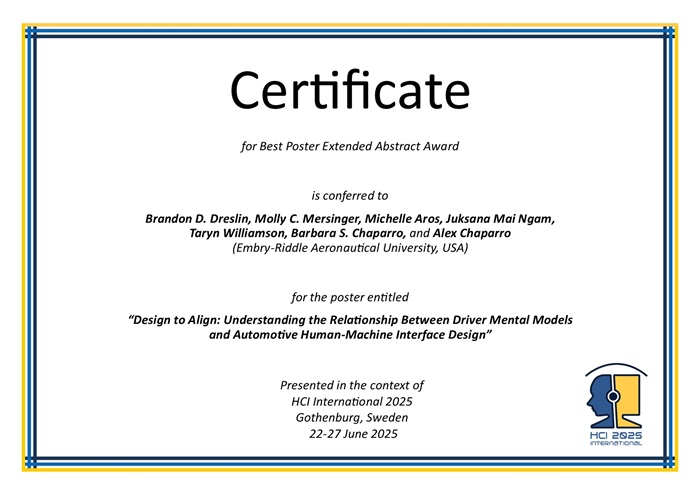The Best Poster Extended Abstract Award
has been conferred to
Brandon D. Dreslin, Molly C. Mersinger, Michelle Aros, Juksana Mai Ngam, Taryn Williamson, Barbara S. Chaparro, and Alex Chaparro (Embry-Riddle Aeronautical University, USA)
for the poster entitled
"Design to Align: Understanding the Relationship Between Driver Mental Models and Automotive Human-Machine Interface Design"

Brandon Dreslin
(presenter)

Best Poster Award, in the context of HCI International 2025, Gothenburg, Sweden, 22 - 27 June 2025

Certificate for Best Poster Extended Abstract Award presented in the context of HCI International 2025, Gothenburg, Sweden, 22 - 27 June 2025
Poster Abstract
"Advances in vehicle technology have raised concerns about drivers’ mental models (i.e., expectations and knowledge of system functionality) when interacting with vehicle human-machine interfaces (HMIs) used to operate comfort/convenience and advanced driver assistance system (ADAS) features. Misalignment between driver expectations and actual system functionality can lead to poor performance. This research, supported by the EcoCAR Electric Vehicle Challenge, examines drivers’ initial expectations for operating features in the 2023 Cadillac LYRIQ. Five participants unfamiliar with the vehicle completed 24 usability tasks involving comfort/convenience (e.g., seat, climate, radio) and ADAS (e.g., adaptive cruise control, semi-autonomous driving, automatic parking) features in the context of a rental car scenario. Behavioral observations, surveys, and interviews measured task success, completion time, perceived self-confidence, and perceived ease. This was supplemented by a cognitive walkthrough with a user experience subject matter expert. Analyses identified four key issues: inconsistent design, violation of user expectations, hidden controls and symbology, and complex menu navigation. Participants’ uncertainty and confusion suggest they developed incomplete or inaccurate mental models of the vehicle’s features. The results of this study highlight the importance of designing automotive systems that support accurate mental model formation. These findings may generalize across vehicles and can inform HMI design improvements industry-wide. Original equipment manufacturers can use this knowledge to enhance both the usability and the user experience of vehicle cockpits."
The full poster is available through SpringerLink, provided that you have proper access rights.


